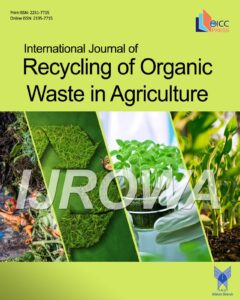Effect of organic mulches on agronomic parameters – a case study of tomato crop (Lycopersicon esculentum Mill.)
Authors
Abstract
Purpose ThePresent study was conducted to investigate the effectiveness of locally available organic mulches on moisture retention, yield and irrigation water use efficiency in tomato crop.
Methods The crop was grown in a randomized complete block design using pine needle mulch, wheat straw mulch and rice straw mulch as treatments and no mulch serving as control.
Results Mulches were able to increase the soil moisture retention through 0.1 m to 0.5 m soil depth. Though mulches behaved differently in soil moisture retention at various depths, the average moisture retention observed for pine needle mulch, rice straw mulch, wheat straw mulch and no mulch was 22.18 %, 21.01 %, 18.52 % and 18.23 %, respectively. The mulches brought about a soil temperature reduction to an extent of 3.3 °C in maximum daily temperature and 1.4-1.8 °C in average soil temperature at 14:00 o’clock during the crop period. The positive effect produced on soil hydrothermal environment was directly reflected through increased leaf area index, plant height and yield. The trend of favourable effect produced by mulches on growth parameters was pine needle mulch > rice straw mulch > wheat straw mulch > no mulch. Mulching increased irrigation water use efficiency by 28.9%, 26.6 % and 12.5 % in pine needle mulch, rice straw mulch and wheat straw mulch, respectively over no mulch.
Conclusion Locally available organic materials can effectively be used to increase soil moisture retention, enhance yield and irrigation water use efficiency in tomato crop.




